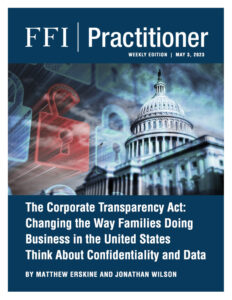
View this edition in our enhanced digital edition format with supporting visual insight and information.
Thank you to this week’s contributors, Matthew Erskine and Jonathan Wilson, for providing an overview of the Corporate Reporting Act, which is scheduled to take effect in the US in the beginning of 2024. In their article, Matthew and Jonathan explain the new reporting requirements for businesses operating in the US and explore the implications for family-owned businesses.
The Corporate Transparency Act (CTA), enacted in 2020, is scheduled to take effect at the beginning of next year – on January 1, 2024 – and family businesses that are either US entities or are registered to do business in the US need to get started now with their preparations for reporting under the act, or face fines and even potential jail time. For many, this act has flown under the radar, and family enterprise advisors should begin helping their clients understand the implications now.
What is the Corporate Transparency Act?
Since the disclosure of US shell companies during the Panama Papers scandal in 2016, foreign governments have been urging the US to tighten its reporting requirements and bring the requirements more in line with the anti-money-laundering laws in the EU and elsewhere. Congress adopted the Corporate Transparency Act (CTA) in 2020 to bring the US closer to the international norms by requiring companies formed or registered to do business in the US to file a beneficial ownership report with FinCEN—the Financial Crimes Enforcement Network of the US Treasury Department. These beneficial ownership reports will enable FinCEN to assemble a massive database of beneficial ownership information.
FinCEN regulations require any company that now exists or is registered to do business in the US, as well as new companies and start-ups that plan to do business in the US, to file an initial beneficial ownership report. The beneficial ownership report for each beneficial owner includes the following:
- Personal Identifiable Information (PII)
- Full legal name
- Date of birth
- Residential street address
- Unique identifying number (a US passport, a US driver’s license, or a foreign passport) with supporting documentation
This information requires reporting confidential information that, in theory, could put corporations and individuals at increased risk of identity theft. Collecting, assembling, and reporting this PII requires new tools and procedures to do so safely and securely.
Who Are Beneficial Owners?
The term “beneficial owner” is defined by the ownership percentages and whether the company is taxed as a partnership or as a corporation. Ownership includes the total combined voting power of all classes of stock owned by the individual, directly or indirectly, or the total value of the ownership as a percentage of the total outstanding value of all ownership interests.
Substantial control is a subjective determination based on whether the individual has substantial influence or control over important decisions of the company. The law has a bias towards including individuals if they have any level of substantial influence over important decisions such as, for example, the opportunity to vote on major issues like the sale or merger of the company.
Applying the Rules of Indirect Ownership to Family Businesses
Applying these new reporting rules to eligible family-owned companies could raise several notable challenges. When an interest in a reporting company is owned by an irrevocable trust, the reporting company needs to determine if the trustee has the authority to dispose of trust assets; if a beneficiary of the trust is the sole permissible recipient of income and principal from the trust; or if the beneficiary has the right to demand a distribution of, or withdraw substantially all of, the assets from the trust. If the trust is a revocable trust, where the grantor has the right to revoke the trust or otherwise withdraw the assets of the trust, then the grantor’s PII must be reported. Therefore, each trust that holds an interest in a family company will need to be reviewed to determine what, if any, PII must be reported.
Common estate planning strategies can also impact the determination of beneficial ownership. For example, a reporting company cannot share the personal information of a minor, but rather would need to disclose this information for the minor’s parent or guardian. Another example would be that a person whose interest is contingent upon a condition precedent, such as surviving to a certain age or being alive at the end of the trust, is not included as a beneficial owner until such time as that condition is fulfilled.
Familial arrangements can give rise to other forms of “substantial control” that can sweep individuals into the scope of beneficial ownership, such as buy-sell agreements, options to purchase, and so on. Again, whether a specific situation requires reporting will depend on the specific terms of the agreements.
Getting Ready for the Corporate Transparency Act
Family business owners’ attorneys and advisors need to understand the requirements of the CTA and initiate discussions of those issues with their clients. To start, make a list of all corporations, limited liability companies, limited partnerships, trusts, or other entities, whether or not you think that they need to report under the new law. Once completed, work with an attorney to determine which of your client’s businesses might be required to report under this new law and which are exempt. For those businesses required to report, determine which individuals would be beneficial owners under the CTA definition; for those beneficial owners, gather the PII required for each beneficial owner. Be aware that beneficial ownership can be direct, as an owner of the interest in the business, or indirect, through the rights the individual may have through a trust. Whether a beneficiary of a trust must report depends on the terms of the specific trust, which will require a review of the terms of the trust.
Owners and advisors will also need to adopt procedures, and perhaps amend relevant company documents, to ensure the business has a system in place to monitor changes in reporting beneficial ownership data. Under the CTA, a reporting company has only 30 calendar days to report any changes to previously reported data to FinCEN. Missing that deadline can result in a $500 per day fine and possible jail time, if FinCEN believes the failure was intentional or willful.
The Corporate Transparency Act imposes new and unfamiliar obligations on family businesses and their advisors. Owners and advisors will need to get started in their journey quickly to understand these new obligations and to explain them to their family business organizations.
Disclaimer: The views expressed in this article are those of the author only. The information contained in this article is provided solely for informational purposes. This article does not constitute legal advice or create an attorney-client relationship. Because of the generality of this article, the information provided herein may not be applicable in all situations or in all jurisdictions and should not be acted upon without specific legal advice from a licensed attorney based on particular situations.
About the Contributors

Matthew Erskine is the managing partner of Erskine & Erskine LLC, a fourth-generation law firm, and The Erskine Company, LLC, a consulting firm. He focuses on strategic planning and legal services for business owners, professionals, individuals, families, collectors, and inheritors of unique assets, helping his clients and their families solve their problems through customized estate, tax, and management solutions. Matthew can be reached at m.erskine@erskineco.com or at www.erskineco.com.

Jonathan Wilson is a co-founder of FinCEN Report Company, LLC, www.fincenreport.com, an online collaboration and filing solution for beneficial ownership reports under the Corporate Transparency Act. He is a partner in the law firm of Taylor English Duma LLP with 31 years of experience in corporate, M&A, and securities matters. He is the author of The Corporate Transparency Act Compliance Guide (to be published by Lexis Nexis in the summer of 2023) and the Lexis Practical Guidance Practice Note on the Corporate Transparency Act.

View this edition in our enhanced digital edition format with supporting visual insight and information.



